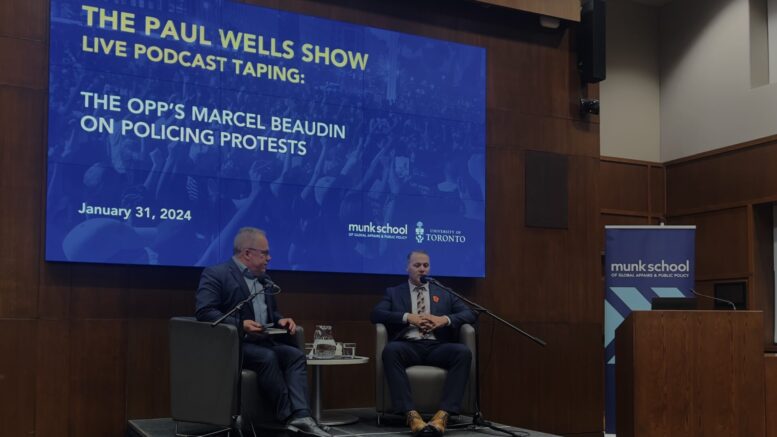Acting Supt. Marcel Beaudin says that as an Indigenous man and co-chair of the Major Incident Management Group, he has never felt as though he doesn’t belong with the Ontario Provincial Police (OPP).
Beaudin spoke on policing protests and his focus on building trust with communities at a taping of the The Paul Wells Show podcast at Munk School of Global Affairs & Public Policy. on Jan. 31.
He was born and raised in Raleigh, Ont. and is a band member of Henvey Inlet First Nation, located between Parry Sound and Greater Sudbury.
“After police college, I was 22 years old. I said that I would go anywhere in the province. For whatever reason I chose the far north, so I ended up going to Red Lake,” Beaudin said.
“That was likely one of the best breeding grounds for the type of police officer I wanted to be, living in a small community, but also having the opportunity as an Indigenous man to be a part of our Aboriginal Relations Team, which was built in 2005.”
Beaudin’s current role entails provincial strategic direction and response to critical incidents and major events. He’s also responsible for the oversight of four programs related to Indigenous policing: the Ontario First Nations policing agreement; the Missing and Murdered Indigenous Women and Girls (MMIWG) implementation team which supports calls to justice; the Indigenous Awareness Training Unit; and the Provincial Liaison Team.
Beaudin said that the Provincial Liaison Team consists of 125 members as a result of the aftermath of Ipperwash, a dispute over Indigenous land that took place in 1995 in Ipperwash Provincial Park, Ont., in which members of the Stoney Point Ojibwa band occupied the park to assert claim to land that was expropriated from them in the Second World War.
“We get called regularly to enforce the rule of law. When you look at the rule of law, as textured in nature, there’s a lot of different considerations, whether it’s reconciliation with Indigenous people, whether it’s support for victims, certainly, there’s enforcement of court orders in there, but it’s textured and multifaceted,” Beaudin said.
Read more from the Toronto Observer:
- Columnist Andrew Coyne says government funding for Canadian journalism is not the answer
- Netanyahu’s intelligence failure played into the hands of Hamas, according to a Toronto political scientist
Throughout the discussion, Beaudin discussed OPP’s national framework, which aims to facilitate peaceful protests. He said major principles of the liaison framework include impartiality, which he referred to as “one of the tenets for success,” along with finding opportunities for mediation or negotiation.
“If you’re telling people what you’re doing, you’re educating them before you do enforcement, you are not being aggressive in nature, because aggressive police tactics typically produce aggressive behavior from a crowd,” Beaudin said.
When asked what de-escalating language OPP uses with protesters, Beaudin said that there is no crafted language that the members use.
“It’s finding what the issues are and then trying to find some measure of success,” Beaudin said.

